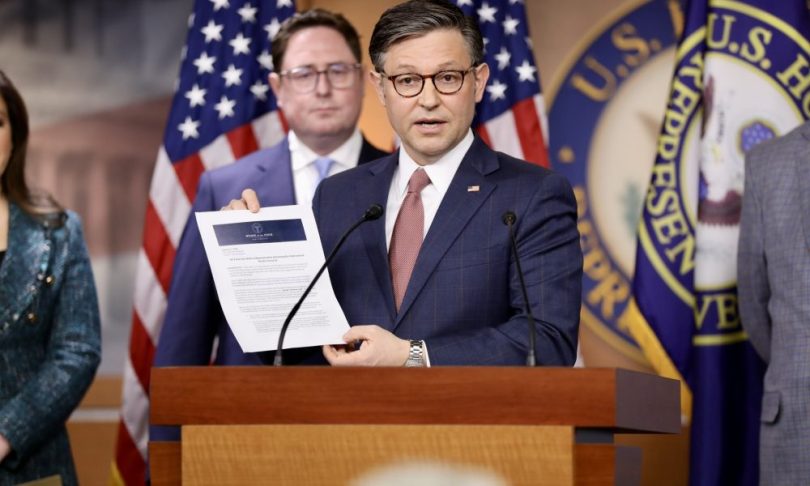WASHINGTON — A federal government employee has filed a complaint to the U.S. House Ethics Committee over an email they received from Matthew Donnellan, chief of staff to Republican U.S. Rep. Carol Miller (W.Va.), which contained combative and anti-trans language.
The Washington Blade has seen the correspondence between the parties, in which the confrontation was apparently kicked off when the congresswoman’s top aide received an email that included the sender’s preferred pronouns in the signature box, triggering his reply.
Donnellan wrote, “As a father, it is disgusting that anyone would ever tell my son or daughter that something is wrong with them and they should take sterilizing hormones or have surgery to cut off their genitals.”
“The fact that you support that ideology by putting pronouns in your signature is awful,” he said, adding, “You’re disgusting and should be ashamed of yourself. Don’t email me or anyone from my office ever again.”
A senior government official told the Blade in a written statement that the email was not out of character for Donnellan:
“I’ve heard from two colleagues several months apart about two separate transphobic emails, using identical language, from Matthew. Unfortunately these emails—though inconsistent with the typical collegiality one would expect from a Chief of Staff on the Hill—is likely a reflection of both increased partisanship on the Hill and a rise in anti-LGBTQ rhetoric from the right.
“Not only is this virtual, hate-filled temper tantrum unbecoming of a Chief of Staff, inappropriate, and unprofessional, it also hurts his boss’s constituents. DC is built on congressional staff, members of Congress, and executive officials being able to put aside their differences to find unlikely areas of commonality where they can work together.
“Even some of the most progressive members, like [U.S. Reps. Alexandria Ocasio-Cortez (N.Y.) and Jerry Nadler (N.Y.)] have partnered with some of the most conservative members, like [U.S. Reps. Matt Gaetz (Fla.) and Jim Jordan (Ohio)], respectively, when they can find common ground.
“Matthew’s refusal to work with an agency department or office just because a staffer has pronouns in their signature isn’t just hateful—it means he’s cutting off opportunities to deliver results for his boss’s constituents, especially in a divided Washington.”
Donnellan told the Blade by email that his response to the government employee is “a reply I send to anyone who uses pronouns or pushes gender ideology in any way.”
“No one is ‘born in the wrong body’ and it’s horrific to tell anyone that they need genital mutilation surgery or sterilizing drugs,” he said. “People who push gender ideology, actively or passively, are awful and should be confronted every single time.”
“If the blunt reality of the terrible things that they are pushing is offensive to them then they should strongly reconsider what it this they believe and the harm that they are doing rather than simply trying to conform to liberal luxury beliefs,” Donnellan said.
Addressing the complaint filed against him, Donnellan said, “I haven’t heard anything from Ethics and doubt that I will, they generally don’t waste their time with sheltered progressives being forced into the real world for the first time.”
A House Ethics Committee spokesperson declined to comment when asked if they could confirm receipt of the complaint.
Asked whether Miller might object to the way that she and her Congressional office are represented with these confrontational email exchanges, Donnellan said his boss’s “motto is ‘cut the bull’, and gender ideology is some of the biggest bull there is.”
On Friday, the congresswoman’s son Chris Miller placed third in the Republican primary contest for West Virginia’s gubernatorial race, where the state’s Attorney General Patrick Morrissey secured his party’s nomination in a decisive victory with 33 percent of the vote.
Leading up to the election, trans issues had emerged as a dominant focal point as the GOP candidates squared off against each other, with Miller’s campaign attacking Morrissey with allegations that he had profited from “the trans agenda” and backed a drug company that “helps turn boys into girls” when working as a healthcare lobbyist in Washington.
In one ad that was paid for by a super PAC chaired by his father, Miller said the pronouns used by Morrissey are “money-grubbing liberal,” an interesting charge to level at the conservative Republican attorney general of West Virginia (even notwithstanding the fact that those three words are not pronouns but, rather, nouns and verbs.)
Declaring preferred pronouns in workplace email signatures has become commonplace in both the public and private sector, whether for purposes of sending an affirming message to transgender and gender expansive employees and officers or to mitigate the chances that either they or their cisgender counterparts might be unintentionally misgendered.
The Biden-Harris administration has pushed for agencies to adopt the practice along with other measures and policies to advance the rights and wellbeing of trans and gender expansive employees across the federal government.
In a 2021 announcement of the U.S. Department of Agriculture’s issuance of updated guidance on the agency’s email signature block, Michael Watts, director of civil rights for the U.S. Forrest Service, noted that “There are plenty of gender-neutral names out there, or names from other cultures that might not give you enough information to know their gender.”
While the inclusion of pronouns was not made mandatory at USDA, he urged employees to “strongly consider taking this small but important step toward supporting inclusiveness in the workplace.”
“The use of pronouns in our email signatures and getting into the habit of including pronouns in our introductions doesn’t really cost us anything,” Watts added, arguing that the move constitutes “a meaningful exchange to others and makes it easier for people to be respectful in how they address each other.”
“I just think it’s the right thing to do,” he said.
Official guidance published by the U.S. Office of Personnel Management, which is responsible for administering policies across the U.S. federal civil service, stipulates that agencies should “take steps to provide the option for employees to include the pronouns they use in employee systems and profiles, including email signature blocks, employee directories and employee profiles.”
Some have gone further, such as by adding pronouns to email signatures for all employees, as the U.S. Department of State did in 2023, while others like USDA have established, as official policy, that “employees are encouraged to include their pronouns in the first line of their email signature block (e.g. he/him/his). Signature blocks are a simple and effective way for individuals to communicate their identified pronouns to colleagues, stakeholders, and customers.”
“For example,” the USDA writes, “adding pronouns to signature blocks also has the benefit of indicating to the recipient that you will respect their gender identity and choice of pronouns.”







